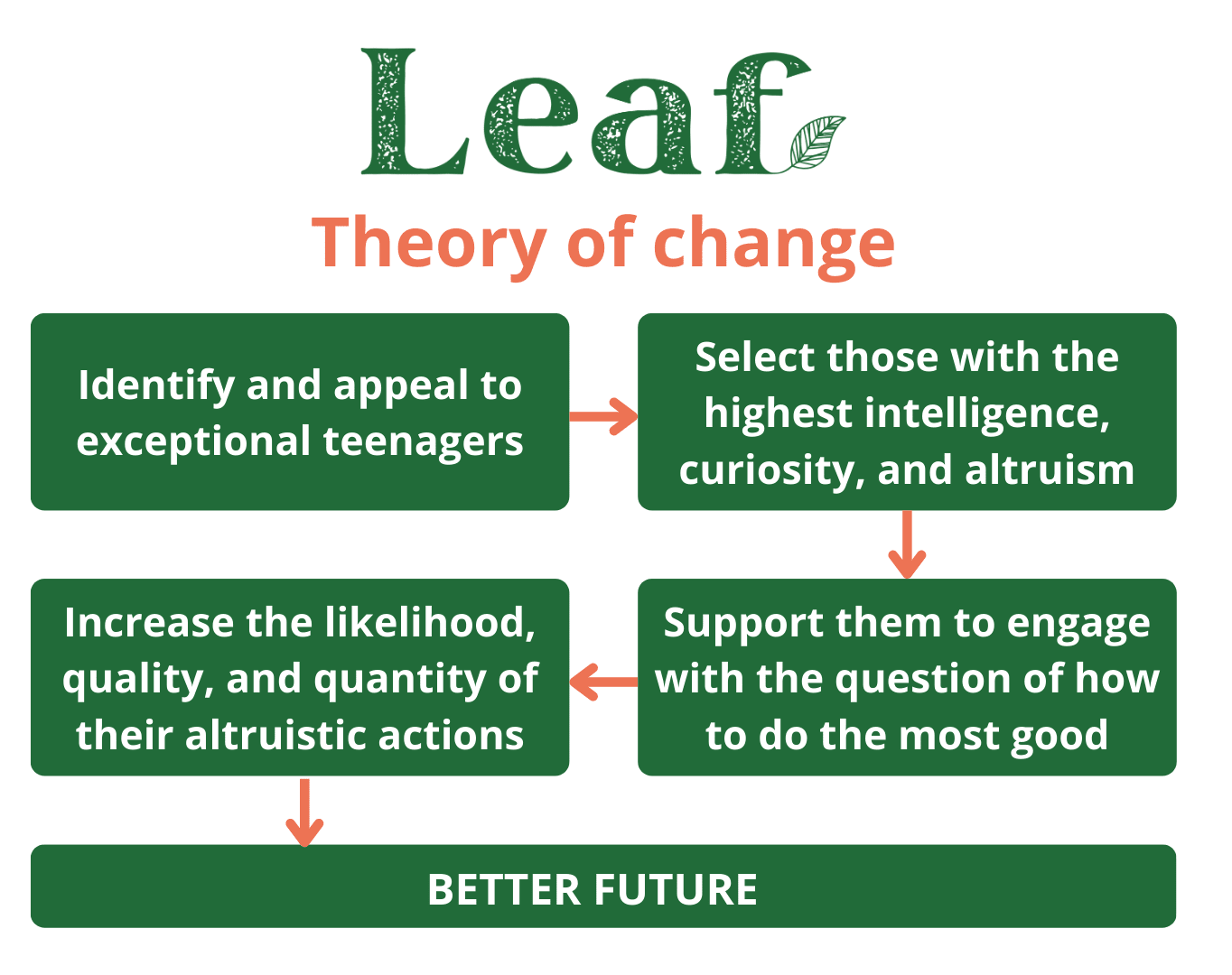Leaf empowers talented teenagers to become the next generation of global problem-solvers by offering scalable, online fellowships that equip them with the skills and knowledge to address the world’s most pressing challenges. In 2024, Leaf supported hundreds of students through our fellowships, with over 1,600 completing our courses.[1]
We aim to double the number of applicants, course completions, and Fellows (top ~7% of applicants; our most intensive support) in 2025 while rolling out a more cost-efficient model, and testing new courses to reach new audiences.
We seek (Manifund page here) £70,000 ($90,000) to enable Leaf to keep operating and expanding in the next 6-12 months. We’re really excited about Leaf’s model and plans, but our continued operation is uncertain without your funding support!
Why should Leaf exist and expand?

In conventional educational systems, teenagers don’t have structure or mentorship to explore how they can do good. The incentives and encouragement for smart teens are all about getting into uni. and demonstrating their intelligence, rather than making use of it to help others. And yet they’re already making decisions relevant to their potential positive impact, like what subjects to study at university, what sort of internships to get or projects to pursue, and which problems to find out more about.
After years of iteration and experimentation with the model of Leaf programmes, we are excited about cheap and scalable online fellowships to help meet this need for impact-focused support.
Top 10 track record highlights from Leaf’s 2024 online programmes
- One-third of our 3,500+ summer applicants completed a five-week course with us (despite only ~200 being offered full fellowship places).
- The Fellows are an exceedingly smart bunch. The median score of 2024 Summer Fellows on the IQ/GMA test developed by Spencer Greenberg & SparkWave was 95th percentile; i.e. they scored higher than 95% of adults that the test was developed on.
- They’re also diverse; ~half are female and ~two-thirds select ethnicities other than white.
- We have likely supported more students who will go to top universities to spend 10+ hours exploring how they can do the most good than the whole UK EA uni group ecosystem.
- Feedback to date has been highly positive, with similar likelihood to recommend scores (averages ~9/10) than EA Global, Non-Trivial, and EA Virtual Programs.
- The majority of Fellows report changes to their career plans and the majority report changes to their views about the world’s most important problems. (Longer-term behavioural data pending surveys early next year!)
- We tentatively estimated that we were generating engagement more cheaply than 80,000 Hours, and creating connections more cheaply than the Centre for Effective Altruism.
- The fellowships are selective so we can provide direct support for the most promising individuals, but we also offer the online content as ~zero-marginal-cost by-products to achieve wide reach, with over 1,600 completions (5+ hours of content) in 2024.
- We’ve focused on refining the model in the UK to date, but expect the model to be scalable internationally, e.g. to reach talent in Europe, the US, and LMICs.
- No major disasters! (We take participant safeguarding and wellbeing seriously.)
For further information about the programmes and the claims above, please contact me (EA Forum message or jonah@leaf.courses) with a message about your background and interest and I will send you the link to our 35-page report from earlier this year.
You can help save Leaf
We have enough remaining funding from our most recent EAIF grant to run a cohort in summer 2025. We are asking for £70,000 ($90,000) to expand the capacities of our Managing Director (me!) and additional part-time contractors to:
- Improve the existing 3 subject-specific courses (maths, biology, history) plus our cause-specific AI course and test the feasibility of adding 1-3 additional courses (we’ve already piloted biorisk, with possible courses in economics, animal advocacy, or s-risks).
- Experiment with measures to ~halve costs per completed accepted participant via streamlined marketing and switching from ‘tutorial-style’ discussion calls (~5) to ‘seminar-style’ discussion calls (10-30).
Secure Leaf’s future. We have contacted several funders but so far have nothing confirmed beyond our reserves (one explicit rejection; no feedback given). Leaf’s future is uncertain and your donation will help us commit fully to Leaf’s next steps without needing to pursue alternative job options for the sake of personal and financial security.[2]
Financial details, alongside more conservative or more ambitious proposals (£30k - £150k) are available upon request.
(We are also currently exploring sponsorships from partner organizations to whom we can direct our applicant pool and most promising fellows to subsidize our cohort costs with the value we provide elsewhere in the EA ecosystem.)
Please contact Jonah Boucher (jonah@leaf.courses) for further details. We also welcome feedback and questions in the comments!
- ^
Given Leaf’s limited capacity, places to our fellowships are competitive. We offer varying levels of participation so that while our most exceptional applicants will receive a higher level of support, discussion, and recognition, everyone who is interested in the programme (and meets our eligibility criteria) will be able to participate in some way. In 2024 we had around 250 Fellow completions, 250 Finalist completions, and the other ~1,200 were Independent Learners. Further details on each of these levels of participation here.
- ^
In the event that we decide to wind down Leaf in the coming year, we will return/donate all remaining funds to the EA Infrastructure Fund.

I think this post would be more compelling if you shared more data (e.g. cost per participant, leading indicators of impact), how much money you got from EAIF etc
Thanks John! Happy to share a few of the specific metrics behind the track record highlights, and we can share more data and reasoning docs. by request. From our spring 2024 programmes (latest analysed data) we estimated:
We hope to roughly ~halve costs/Fellow this coming summer based primarily on larger discussion group sizes and lower facilitator costs.
This is helpful, thank you!